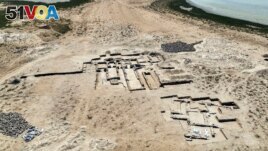07 November 2022
An ancient Christian site has been discovered on an island off the coast of the United Arab Emirates, officials announced recently. The religious complex, a monastery, could date to a time before the spread of Islam across the Arabian Peninsula.
The monastery is providing researchers a lot of information about early Christianity in the Persian Gulf area. It is the second such monastery found in the Emirates, dating back as many as 1,400 years.
The two monasteries became lost to history in the sands of time.

This handout photo from the Department of Archaeology and Tourism of Umm al-Quwain shows an ancient Christian monastery uncovered on Siniyah Island in Umm al-Quwain, United Arab Emirates. (Nasser Muhsen Bin Tooq/Department of Archaeology and Tourism of Umm al-Quwain via AP)
As Islam spread in the area, experts believe Christians slowly became Muslim. Today, Christians remain a minority across the wider Middle East.
Timothy Power of the United Arab Emirates University described the UAE today as a "melting pot of nations."
Power helped investigate the newly discovered monastery.
He added, "The fact that something similar was happening here ... 1,000 years ago is really remarkable and this is a story that deserves to be told."
The monastery sits on Siniyah Island in Umm al-Quwain, an emirate some 50 kilometers northeast of Dubai. The island has a series of sandy areas coming off of it like fingers. On one, to the island's northeast, researchers discovered the monastery.
Samples found in the monastery's foundation date between 534 and 656. Islam's Prophet Muhammad was born around 570 and died in 632.
Seen from above, the monastery's floor plan suggests early Christian worshippers prayed within a small church. Rooms within the monastery appear to hold a baptismal area, as well as an oven for baking bread or wafers for communion rites. Another area also likely held an altar and an installation for communion wine.
Next to the monastery sits a second building with four rooms, likely around an open area known as a courtyard. This was possibly the home of an early church leader such as an abbot or even a bishop.
The monastery recently saw a visit from Noura bint Mohammed al-Kaabi, the country's culture and youth minister, as well as Sheikh Majid bin Saud Al Mualla, the head of the Umm al-Quwain's Tourism and Archaeology Department and a son of the emirate's ruler.
The UAE's Culture Ministry has also supported the dig, which is ongoing. Just hundreds of meters away from the church, there is a collection of buildings that archaeologists believe belongs to a pre-Islamic village.
Nearby also sits a village that the British bombed in 1820 before the area became part of what was known as the Trucial States, an early form of the modern UAE. That village's destruction brought about the creation of the modern-day settlement of Umm al-Quwain on the mainland.
Historians say early churches and monasteries spread along the Persian Gulf to the coasts of present-day Oman and all the way to India. Archaeologists have found other similar churches and monasteries in Bahrain, Iraq, Iran, Kuwait and Saudi Arabia.
In the early 1990s, archaeologists discovered the first Christian monastery in the UAE, on Sir Bani Yas Island, today a protected natural area and site of luxury hotels. It similarly dates back to the same period as the new find in Umm al-Quwain.
However, evidence of early life along the Khor al-Beida area in Umm al-Quwain dates as far back as the Neolithic period. This evidence suggests continuous human presence in the area for at least 10,000 years, Power said.
Power said that building developments led to the archaeological work that discovered the monastery. The area will be fenced off and protected, he said, though it remains unclear what other secrets of the past remain hidden just under a thin layer of sand on the island.
"It's a really fascinating discovery because in some ways it's hidden history — it's not something that's widely known," Power said.
I'm John Russell.
Jon Gambrell reported on this story for the Associated Press. John Russell adapted it for VOA Learning English.
________________________________________________________________
Words in This Story
melting pot – n. a place (such as a city or country) where different types of people live together and gradually create one community
remarkable – adj. unusual or surprising : likely to be noticed
baptism – n. a Christian ceremony in which a small amount of water is placed on a person's head or in which a person's body is briefly placed under water
communion – n. a Christian ceremony in which bread is eaten and wine is drunk as a way of showing devotion to Jesus Christ
altar – n. a platform or table used as a center of worship in Christian ceremonies and services
fascinating – adj. very interesting or appealing